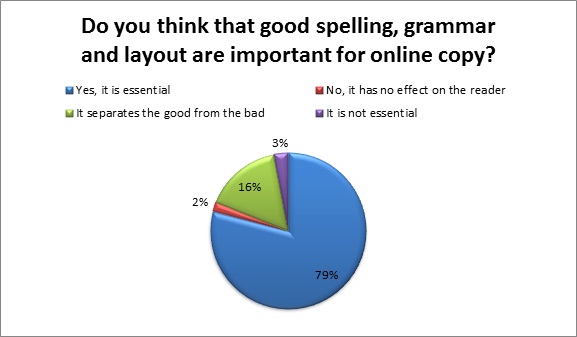Over the past months, it has become increasingly more obvious to me that many public facing companies and brands have allowed work to be published online in their name with quite basic and obvious spelling, layout and grammatical errors. This led me to question how many people actually think that good written work is an important facet in creating a brand and reputation.
I decided to carry out a study into the perception others have on this topic. I asked the question:
‘Do you think that good spelling, grammar and layout are important for online copy?’
There were four possible answers to choose from:
Yes, it is essential
No, it has no effect on the reader
It separates the good from the bad
It is not essential
Below are the results:

It is clear from these results that the vast majority of people believe that not only is it important to produce high quality written work, but in fact it is essential.
Of course, before I started this research I already had my own opinion on this subject. I felt very strongly that if you are to promote your brand, of any size or in any industry, you must ensure that the content you create is of a good standard. After all this is the basis of your communication with the consumer over the internet.
It was very comforting to me to discover that many other people felt the same way;
One voter commented that ‘poor language and design create the impression that your business’s credentials may not be bona fide. And the web world is all about trust.’ This is a really strong comment to demonstrate that what people read really does create an impression and perception about your business.
Another comment that I found particularly interesting was from a voter who voted for ‘Yes, it is essential,’
‘Yes, it’s absolutely essential to get these elements of your online copy correct. You wouldn’t settle for errors in offline copy, so why would online be any different? Anything you publish, anywhere, is a touch-point with potential customers and as such it is part of your brand. It should be treated with care, just like anything else you produce in the name of your business.’
This comment was of particular interest to me as it stated the most obvious comparison that even I hadn’t considered. If I were to read a novel or text book I would be far less tolerant of spelling errors or poor punctuation. There is a certain standard that we have all come to expect from the written word and this, rightly so, should be carried over to any online content too.
The main point here is that you are trying to create a solid, respectable brand that will attract new business and increase the trust and respect from customers both old and new. As an SEO agency, we produce a lot of online copy therefore a great deal of importance is placed on the quality of the content we create. A brand looking to optimise their site through the quality of content online should consider employing an SEO agency. Our off-page executives come predominantly from writing backgrounds (for example journalism or creative writing) therefore benefit from having in-depth knowledge on appropriate writing styles and techniques.
How do I ensure my content is ‘good quality’?
Of course, this is quite a broad question and it can be interpreted in many ways. What one person deems to be an excellent standard, another might not completely agree with. Where one person thinks there needs to be a comma another might prefer a semi colon and so on.
These squabbles could go on forever, however, there are a lot of actions that can be taken to improve the content quality of your online and offline copy that have a far more black and white solution.
Many people are of the opinion that English and Maths are polar opposites. Maths has a problem and a solution – end of story. With English there is a lot of grey area surrounding what is ‘correct’. My belief is that, yes, English does have more rules and exceptions to those rules but essentially, if you take a more black and white approach, you can really improve upon the work you produce.
Here are 5 top tips to ensure you minimise mistakes in your work:
1. Copy check
This is a simple yet effective habit to get into. Check over any work that you create to look for spelling errors, check the font is correct, ensure images are formatted properly and the layout is as you would like.
2. Secondary copy check
If you lack in confidence or just want another set of eyes to look over your work, then this is a great way to flag up any errors you may have missed. I would always advise you to have a secondary copy check on any work. Someone who is detached from the topic will spot mistakes easier because they do not have a pre-conceived idea of what is coming next.
Some companies have a proof reader / content quality team whose role it is to ensure that any mistakes are corrected before content ‘goes live’. In this ever changing world of online communication, your written word is becoming an increasingly vital facet that must be maintained to the standards that the reader and your company would expect.
3. Don’t rely on ‘spell-checker’
Spell-checker can be a really useful tool. It underlines words that are obviously spelt wrong. It makes them easier to spot and subsequently correct. However, in my experience of proof reading blogs, articles, contracts, proposals and other written submissions, there are frequent times that I have noticed it does not pick up on all spelling errors and especially plural/singulars. Never rely on spell checker. Yes indeed use it, but only alongside your own checks.
4. Checking and Editing
Remember there is a difference between checking work and editing work. When you check work, you are looking at mistakes such as spelling, punctuation, perhaps separating paragraphs more appropriately and the overall flow of the piece. This should be a fairly quick task. For example a 500 word article should only take 5 minutes to read over.
5. Set a company standard
For many areas in ‘English Language’ there are often varying opinions on what is the right technique. Older generations may consider one style to be more accurate than a younger generation. For matters where there are conflicting opinions (such as whether there should be single or double spacing at the start of every sentence), it is a good idea to set standards that the whole company must comply with. Agree on what will be the company standard moving forward and then stick to that. It may be that your style conflicts with some external readers but internally you will create a consistent company standard. This enables the company to appear well organised and professional.
Editing work is far more in depth and focuses a lot more on the actual story/content.
Here are some other comments made by the voters of the poll, it is interesting to note that the 2% of voters who said ‘It has no effect on the reader’ did not leave comments. I would have been really intrigued to know how they came upon their conclusions.
‘It’s all about perception….and perception is reality. If you want to be perceived as professional, it makes a huge difference. If you just don’t care, it does not.’
‘Just because it is on-line instead of in “print” that is no excuse for bad spelling, grammar and layout.’
‘Wow, the results of this poll have frightened me a little. I know my website has grammar issues and the occasional spelling mistake but I still get work from it! I wonder how much more work I would gain if it was word perfect?’
‘Communication is undoubtedly the most important skill one can use in business. Whether it is verbal, written or non-verbal (body language et al) it is important to perfect the skills to convey your message, whatever it may be.’
‘Good spelling, grammar and layout is even more important for online copy. Generally speaking, people’s attention span when reading from a screen is lower and therefore it’s essential to get your message across quickly, succinctly and unambiguously.’
‘Considering how many people say it is essential, it is amazing how many blogs, articles and even news articles by professionals have basic mistakes in them. Perhaps the people voting are not the ones creating the content.’
‘It is dependent on the audience and delivery method and the message.’
‘If you can’t even spend the time necessary to double check your spelling and grammar, how do you expect your customers to instill faith in you as a product or service provider?’
With the results of this survey it is nice to see that from the 321 votes cast – the distribution of age, seniority and gender is fairly evenly spread. This should, in theory mean that the poll has created a fairly even outcome including all types of job role, industry and subsequent opinion. Even though the poll has now been closed for well over a week, there are still comments being posted on this topic.

What can we take from this?
I think it is fairly obvious that overall there is a great deal of importance placed on the quality of written work online. Be it product descriptions on a company retail site, a blog post or article, consumers have a certain level of expectation in the quality of work produced by the brands they trust. It seems clear to me that, if you want to be one step ahead of the competition and create a solid and trustworthy brand, then you must pay attention to the details. This includes any written and verbal communication that you put out there for the world to see.
I would love to hear other people’s thoughts on this topic. Any comments are welcome.


